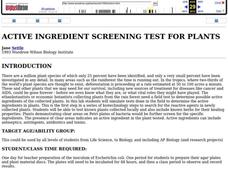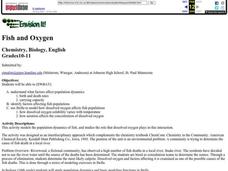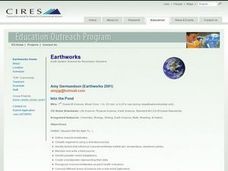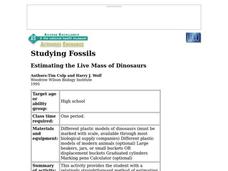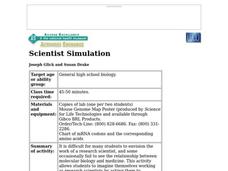Curated OER
Active Ingredient Screening Test for Plants
Students determine if various plant materials contain active ingredients which will inhibit the growth of bacteria. They identify plant materials and their degree of sensitivity.
Curated OER
Superbugs and Antibiotic Resistance
High schoolers complete experiments on antibiotics and antimicrobials. In groups, they explain how antibiotics affect the evolution of microorganisms. They test various types of bacteria to discover how much resistance they have to...
Curated OER
The Birds and the Bees, and the Flowers and the Trees
Students examine the roles in which animals play in the pollination of plants. They recognize that flowers have male and female sexes. Students describe cross pollination and propose reasons for cross pollination through narration of a...
Curated OER
A Living Watershed
Students, through this series of lessons, use local resources, speakers, print and video materials, as well as standard text materials to study the ecosystem of the local watershed.
Curated OER
Fish and Oxygen
Young scholars explore what factors affect population dynamics, identify factors affecting fish populations, and use Stella to model how dissolved oxygen affects fish populations.
Curated OER
Dishing the Dirt Part 2
Students explore the differences between specific soil characteristics. They participate in an experiment in which they discover soil texture. They write their observations in a journal.
Curated OER
The Cloning of Plasmid and Spinach DNA
Students will first extract genomic DNA from spinach and perform a restriction enzyme digestion on both the spinach DNA and the plasmid using the same restriction enzyme. They then ligate the cut plasmid DNA with the cut spinach DNA in...
Curated OER
Mendellian Genetics
Students describe the inheritance patterns other than simple dominance. They are taught how Mendel's principles apply to all organisms. Students review the use of Punnett Squares. They are taught the principles of probability and...
Curated OER
Why Don't Whales Have Legs?
Students are given a variety of materials and are asked to design a heat loss experiment that results in a reasonable explanation of "Why don't whales have legs?" students work with the theory of natural selection.
Curated OER
Efficiency Means Getting More for Less
Students measure water and make predictions about efficiency.
Curated OER
Wolf Pack in a Bottle
Learners participate in an activity of a mock electrophoresis using paper chromatography to study DNA and genetic restriction mapping.
Curated OER
Into the Pond
Seventh graders use a pond to explore macroinvertebrates and other organisms. They use a dichotomous key to classify the organisms and maintain a journal recording their findings.
Curated OER
Chesapeake Bay Population Studies
Students determine how to use a quarter meter quadrant to find population density, relative density, frequency and how to calculate a diversity index while participating in a virtual field trip. They study how to establish a Correlation...
Curated OER
Dishing the Dirt Part 3
Students collect and examine different soil samples. They test for specific types of soil elements and the pH level. They answer questions about optimum growing conditions as well.
Curated OER
Dishing the Dirt Part 1
Students create a soil center on their school grounds. They begin to write in their science journals. They participate in an experiment that helps the community begin their own gardens.
Curated OER
Remote Control
Students explore and evaluate several distance learning Web sites. They defend whether or not they would like to participate in the distance learning experience by either writing a proposal for including this distance learning project...
Curated OER
SEPARATION OF A STARCH-GLUCOSE MIXTURE USING GEL FILTRATION
Students make a starch-glucose solution and pour it through gel in order to separate the starch from the glucose. They examine how starch is a larger molecule than glucose and test for the presence of these substances using other...
Curated OER
CULTURING PLANTS FROM EMBRYONIC PLANT TISSUE
Students use this laboratory exercise as a growth medium that contains the macronutrient and micronutrient needs of plants. They observe the effects of different hormones on tissue cultures and must use variations of the basic growth...
Curated OER
Estimating the Live Mass of Dinosaurs
Students calculate the volume of scale model dinosaurs using a water displacement method. They use formulas to calculate the live mass each of the species of dinosaur. Then they complete and discuss a series of questions.
Curated OER
Scientist Simulation
Learners imagine themselves working as research scientists completing the end-steps of a molecular research project and interpreting the data. They compare the gene sequences of normal and abnormal mice and evaluate the protein product...
Curated OER
Estimating the Live Mass of Dinosaurs
Students estimate the live mass of dinosaurs. Using dinosaur and modern animal models, students use simple displacement methods to calculate the volume of the models. They calculate the masses of each model. Students compare the...
Curated OER
Studying Living Organisms
Young scholars discover and discuss the differences between prokaryotes and eukaryotes. Using a microscope, they examine various prepared slides of prokaryotic and eukaryotic organisms.
Curated OER
Plant Biotechnology: Controlling Tissue Differentation
Young scholars demonstrate skills of biotechnology stringent aseptic technique and statistical analysis. They describe hormonal control of plant tissue differentiation and relate this to gene expression. Students observe the effects of...
Curated OER
Culturing Plants from Embryonic Plant Tissue
Student groups use lima beans to represent dicots and corn to represent monocots, soak the seeds, and separate the embryos from the cotyledons. They then place the seeds in Petri dishes in agar and observe for at least one week recording...
Other popular searches
- Biology Lab Photosynthesis
- Enzyme Biology Lab
- Biology Lab Microscopes
- Biology Lab Safety
- Biology Lab Skills
- Biology Lab Protocol
- Biology Lab Safety Lesson
- Biology Lab Energy
- Introduction to Biology Labs
- Biology Lab Skills Lesson
- Biology Lab Sskills
- Enzyme Biology Lab Pectinase


